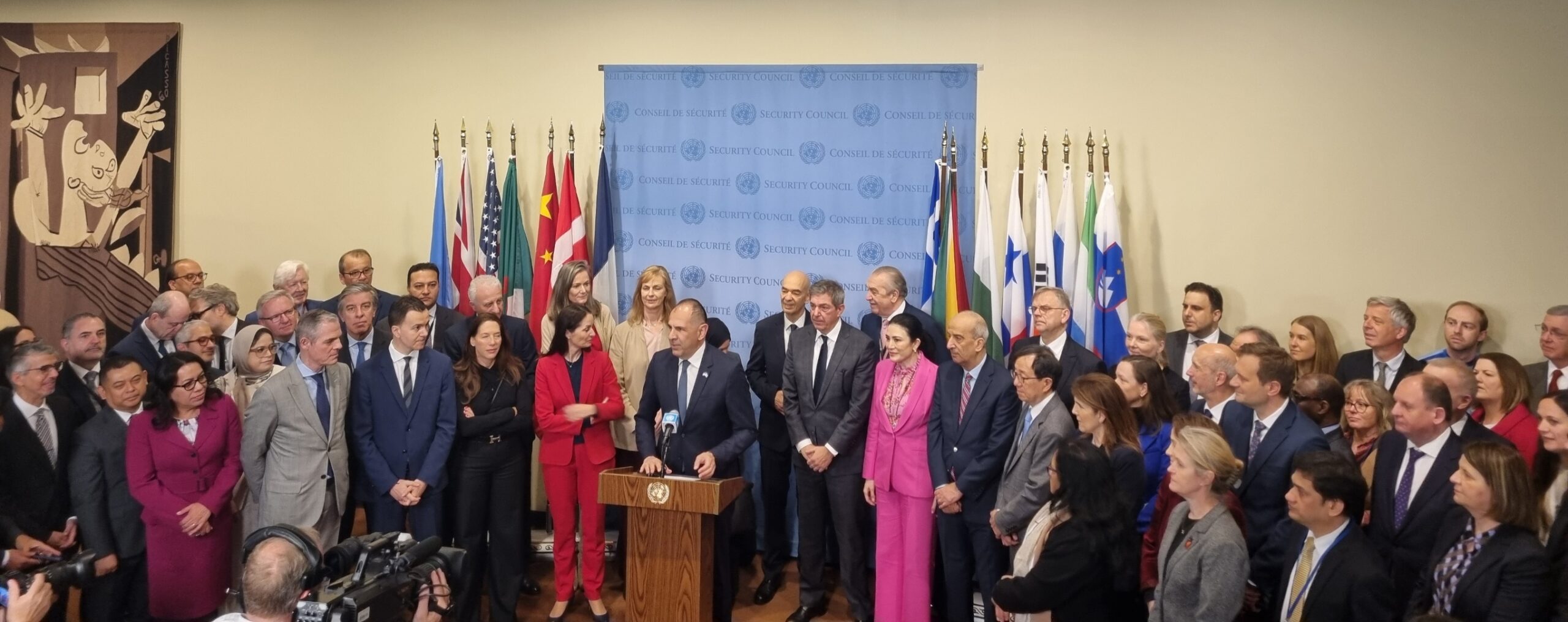Thursday, 22 May 2025
I am honored to deliver this statement on behalf of the delegations of Algeria, Armenia, Australia, Austria, Bahamas, Bahrain, Bangladesh, Belgium, Bosnia and Herzegovina, Brazil, Bulgaria, Canada, Chile, China, Colombia, Costa Rica, Croatia, Cyprus, Czech Republic, Denmark, Dominican Republic, Egypt, Estonia, the European Union, Finland, France, Georgia, Germany, Greece, Guatemala, Guyana, Iceland, Indonesia, Ireland, Italy, Japan, Jordan, Korea, Kuwait, Latvia, Lebanon, Liechtenstein, Lithuania, Luxembourg, Malaysia, Malta, Mexico, Moldova, Monaco, Montenegro, Morocco, Netherlands, New Zealand, North Macedonia, Norway, Oman, Pakistan, Palestine, Peru, Poland, Portugal, Qatar, Romania, Saudi Arabia, Seychelles, Sierra Leone, Singapore, Slovakia, Slovenia, South Africa, the Sovereign Order of Malta, Spain, St Vincent and the Grenadines, Sudan, Sweden, Switzerland, Timor- Leste, Türkiye, the UAE and Uruguay committed to upholding international humanitarian law and protecting civilians in armed conflict.
This year, civilians in armed conflicts continue to live under unthinkable conditions of constant danger, insecurity and suffering. The United Nations recorded at least 36.000 civilian deaths in 14 armed conflicts in 2024. The use of explosive weapons in populated areas caused tens of thousands of casualties across many conflicts, while landmines and explosive remnants of war continued to endanger civilians.
According to OCHA, Gaza faces the “worst humanitarian crisis” since the commencement of hostilities, following the attacks of October 7, 2023, with civilians facing starvation and being at critical risk of famine, according to the IPC, and with hundreds of aid workers having been killed since the conflict began. In Sudan, civilians bear the brunt of violence, with millions internally displaced and over half of the population facing high levels of acute food insecurity. Widespread civilian suffering was also reported in the Democratic Republic of the Congo, Mali, Mozambique, Myanmar, Nigeria, Somalia, South Sudan, the Syrian Arab Republic, Ukraine and elsewhere.
This cannot continue. Today, we come with one clear message: The protection of civilians is not optional. It is a legal obligation under international humanitarian law, and a moral imperative we cannot afford to neglect.
In the face of deepening conflict and disregard for civilian life in too many regions, we call upon all parties to armed conflict to respect international humanitarian law in all circumstances, and we call upon all Member States to use their influence to ensure all parties respect for it. This is the baseline—not an aspiration, but a binding commitment, a legal obligation.
Civilian women and men, children, older persons, and persons with disabilities, all suffer. Health workers, farmers, teachers are killed, injured, and forced to flee. Civilians are too often targeted or simply abandoned in the calculus of war. Their protection must not be a secondary consideration — it must be central to all military planning and political decisions. We reiterate our call to parties to conflict to protect civilians and civilian objects, including those indispensable to civilians’ survival, and to treat all persons in their power humanely.
We commend the vital role of humanitarian actors and we condemn all acts of violence and threats against them. Last year was the deadliest year on record for humanitarian personnel when more than 360 humanitarians were killed in 20 countries. This has to stop. We reaffirm our determination to take concrete measures and use diplomatic means to ensure the safety and security of humanitarian personnel, and to enable them to carry out their activities and mandate in accordance with humanitarian principles.
We urge parties to conflict to allow and facilitate, as required by international humanitarian law, safe, rapid and unhindered humanitarian access to all civilians in need. The instrumentalization of aid for political, military or security strategic objectives is unacceptable.
We recognize the important work of journalists, media professionals and associated personnel, and urge parties to conflict to respect their professional independence and rights. At a time when misinformation and disinformation have become easier and widespread, often fueling conflict, independent media and on-site reporting are of particular importance.
We reaffirm that accountability for violations is essential. Alleged violations of IHL and alleged human rights violations and abuses in armed conflict must systematically be met with credible investigations and perpetrators must be held accountable. Impunity cannot be the norm. Impunity is not just a failure of justice—it is a license for repetition.
With “Protection of Civilians Week” underway and today’s open debate bringing the spotlight back where it belongs—on civilians caught in conflict—we emphasize that protection is not just about response to crisis – it is also about prevention. We need a more comprehensive approach towards the full protection of civilians.
Let us reiterate our collective responsibility to protect the most vulnerable, to uphold international law, to prioritize the safety, dignity and rights of civilians and to ensure that their faces and voices — so often invisible and silenced behind statistics — remain central to our actions.
Let us recommit not only to words, but to concrete steps — toward protection, toward accountability, and ultimately, toward peace.
Thank you.

